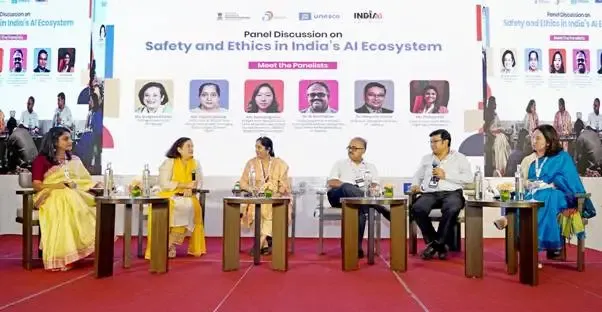How is UNESCO and IndiaAI Mission Promoting Safe and Trusted AI?

Synopsis
Key Takeaways
- Ethics-by-design is crucial for AI development.
- Collaboration between UNESCO and IndiaAI Mission aims for an inclusive AI ecosystem.
- AI RAM initiative supports regulatory capacity building.
- Over 200 experts are engaged in discussions on responsible AI.
- The initiative will produce an India-specific AI policy report.
New Delhi, June 6 (NationPress) Tim Curtis, Director of the UNESCO Regional Office for South Asia, emphasized the necessity of implementing an ‘ethics-by-design’ strategy for AI development. He pointed out that achieving genuine inclusivity demands not only functionality but also the early incorporation of fundamental ethical principles.
He reiterated UNESCO’s commitment to supporting India's vision of an AI ecosystem that is inclusive, transparent, and trustworthy.
Abhishek Singh, Additional Secretary at MeitY and CEO of the IndiaAI Mission, showcased India's balanced, pro-innovation stance on AI, focusing on building AI in India to serve its needs through safe and reliable applications.
He detailed significant initiatives under the IndiaAI Mission, such as the ‘AI Kosh’ platform for data sets, the selection of companies to create foundational models, and backing for responsible AI projects centered on the safe and trusted AI pillar.
This week, the UNESCO Regional Office for South Asia, in partnership with the IndiaAI Mission and Ikigai Law as the executing partner, conducted a multi-stakeholder consultation on the AI Readiness Assessment Methodology (RAM) in India.
This event marked the last of five stakeholder consultations in the AI RAM initiative by UNESCO and the IndiaAI Mission, following previous sessions in New Delhi, Bengaluru, Hyderabad, and Guwahati.
The project aims to produce an India-specific AI policy report that evaluates strengths, recognizes growth potential, and provides actionable recommendations for the ethical and responsible use of AI across various sectors.
The AI RAM serves as a diagnostic tool to assist governments in enhancing their regulatory and institutional capacities in AI.
This initiative is particularly timely as India pursues its ambitious IndiaAI Mission.
At the heart of this mission is the safe and trusted AI pillar, which signifies a commitment to ensuring safety, accountability, and ethical practices in AI development and implementation.
By fostering indigenous frameworks, robust governance tools, and self-evaluation guidelines, the mission seeks to empower innovators and democratize the benefits of AI across different sectors.
Over 200 experts from government, academia, and industry discussed strategies for the ‘Responsible AI’ adoption in India.










